Fairphone
description: a social enterprise company that aims to develop smartphones with ethical considerations, such as fair labor conditions and conflict-free materials
12 results
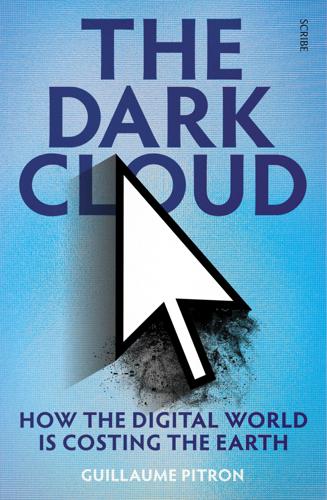
The Dark Cloud: How the Digital World Is Costing the Earth
by
Guillaume Pitron
Published 14 Jun 2023
Also visit theendofownership.com. 55 Short for fabrication laboratory. 56 Interview with Martine Postma, founder of the Repair Cafés movement, 2020. 57 For example, ‘The environmental footprint of the digital world’, GreenIT, September 2019. 58 ‘White Paper on the Digital Economy and the Environment’, op. cit. 59 The Repairability Index was promulgated under Law no. 2020-105 of 10 February 2020 on anti-waste and the circular economy. 60 ‘Global e-waste surging: up 21% in 5 years’, United Nations University, 2 July 2020. 61 closingtheloop.eu 62 A similar initiative, Recy-Call, was launched in 2018 by Belgian entrepreneur Domien Declercq. It ceased its activities in 2019 as it did not have a viable business model. 63 Interview with Agnès Crepet, Head of Software Longevity and IT at Fairphone, 2020. 64 As an example, Fairphone managed to maintain the compatibility of its Fairphone 2 range, manufactured in 2015, with Android 9. Read ‘Redefining longevity: Android 9 now available for Fairphone 2’, fairphone.com, 25 March 2021. Chapter Three: The dark matter of a digital world 1 wupperinst.org. 2 Interview with Jens Teubler, research at the Wuppertal Institute for Climate, Environment and Energy, 2020. 3 See the report ‘Calculating MIPS: Resource productivity of products and services’, by Michael Ritthof, Holger Rohn and Christa Liedtke, in cooperation with Thomas Merten, Wuppertal Spezial 27e, Wuppertal Institute for Climate, Environment and Energy, 2002. 4 Interview with Karine Samuel, professor and researcher at Université Grenoble Alpes, and part of the team ‘anticipating and managing risks’, 2019. 5 According to the same Wuppertal Institute report, ‘…all technically caused movements of materials in the ecosphere are examined’, Calculating MIPS: Resource productivity of products and services’, op. cit. 6 Frans Berkhout, Joyeeta Gupta, Pier Vellinga, Managing a Material World: Perspectives in Industrial Ecology, Springer, 2008. 7 ‘La stratégie du ‘facteur 10’ et du ‘sac à dos écologique’, Les Cahiers du développement durable, Cahier 4: outils [‘The ‘factor 10’ and ‘ecological rucksack’ strategy, the Sustainable Development Books, Book 4: Tools’], Institut Robert-Schuman Eupen (Belgium). 8 ‘La stratégie du ‘facteur 10’ et du ‘sac à dos écologique’, op cit. 9 For example, ressourcen-rechner.de/calculator.php?
…
The scheme has already been taken up by several corporations (KPMG, ING Bank, and Accenture) and administrations in the Netherlands (the municipalities of Amsterdam, Utrecht, and Groningen), which have bought thousands of phones for employees. The scheme is a way for them to improve their reputation as responsible players, while making de Kluijver’s repatriation activities cost-effective.62 Finally, phones should overwhelmingly be bought from Fairphone, the first company to bring ‘ethical’ smartphones to the market. Hailing from the Netherlands, Fairphone operates out of the IJhaven port in Amsterdam, which I was invited to visit in winter 2020. In an immense workspace, dozens of engineers and salespeople speaking a variety of languages bustle about in a relaxed atmosphere. What makes the phones manufactured here the most sustainable in the world are, first and foremost, the company’s efforts to ensure that the metals used to make them are mined ethically.
…
What makes the phones manufactured here the most sustainable in the world are, first and foremost, the company’s efforts to ensure that the metals used to make them are mined ethically. It also designs its phones to last as long as possible. ‘We want our users to keep their phones for seven to eight years’, a member of the team tells me.63 The trick is modularity, meaning the Fairphone’s parts can be assembled and disassembled separately, and therefore replaced separately. ‘This is especially important for the battery and the screen’, says a technician. ‘We also need to be able to change the speaker, the front camera, the selfie camera … I won’t lie, it’s a real nightmare’, she sighs.
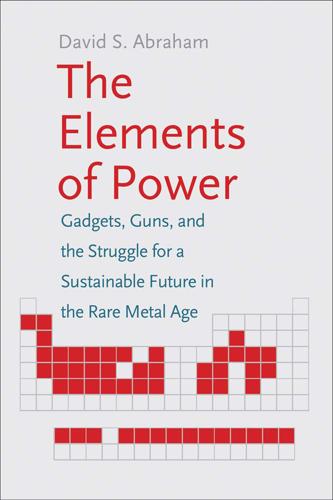
The Elements of Power: Gadgets, Guns, and the Struggle for a Sustainable Future in the Rare Metal Age
by
David S. Abraham
Published 27 Oct 2015
Caroline Winter, “Why It’s Hard to Make an Ethically Sourced Smartphone,” Bloomberg Businessweek, September 20, 2013, accessed April 12, 2015. http://www.bloomberg.com/bw/articles/2013-09-20/why-its-hard-to-make-an-ethically-sourced-smartphone; Victoria Knowles, “How Fairphone is dialed in on supply chain sustainability,” Greenbiz, August 13, 2014, accessed April 12, 2015, http://www.greenbiz.com/blog/2014/08/13/how-fairphone-dialed-supply-chain-sustainability; Karien Strouken, “Choosing the right materials for your Fairphone,” Fairphone Blog, November 5, 2012, http://www.fairphone.com/2012/11/05/choosing-the-right-materials-for-your-fairphone/. 39. European Union/European Commission, “Setting up a Union System for Supply Chain Due Diligence Self-Certification of Responsible Importers of Tin, Tantalum and Tungsten, Their Ores, and Gold Originating in Conflict-Affected and High-Risk Areas,” Proposal for a Regulation of the European Parliament and of the Council, Brussels, March 3, 2014, accessed October 30, 2014, http://trade.ec.europa.eu/doclib/docs/2014/march/tradoc_152227.pdf. 40.
…
“They don’t know because of how much the manufacturing world has changed over the past several decades.”37 At one time a car manufacturer made most of its components, but today’s companies outsource. As Kirchain tells me, Ford will specify the sound quality and size of a radio for their vehicles, but does not state what elements must be in the radio microprocessors that affect its function. Even Bas van Abel, the founder of Fairphone, a company specifically set up “to use only source materials extracted in acceptable humane and environmental conditions,” doesn’t know the origins of all his materials. And he may never know.38 In 2010, the U.S. government passed legislation forcing companies to state whether the materials they use in their products come from mines run by warlords in the Congo.
…
See also Sustainable use Environmental Protection Agency, 187 Environmental regulations, 184 Erceg, Luka, 211–12 Ernst and Young, on cost overruns, 58 Estonia, energy production in, 134–35 European Union: on Chinese export controls, 36 conflict materials, actions on, 111 rare metal security strategy, 205 on rare metals shortages, 136–37 Europium, 2, 151, 167 EV (electric vehicles), 136, 145–48, 270n30 Extractive Metallurgy of Rare Earths (Krishnamurthy and Gupta), 70 Eyang Subur, 126 F-35 Lightning II aircraft, 168 Facebook, 126 Factory Number 7 (Silmet), 67–69, 72–76, 80–82 Fairphone, 110 Fanya Metal Exchange, 97 FARC rebels (Colombia), 109 Fiber optics, 124 Fink, Colin, 162 First Solar, 149 Flat-screen technology, 122–24 Fleming, Rowland, 59 Flotation (processing method), 162 Ford, Henry, 52 Ford Motor Company, 132, 144–45 Fraud, 59, 98 Free markets, U.S. faith in, 209 Frontier Rare Earth, 76–77 Fujitsu, 20 Fundraising, for metals production, 245n29 Futures trading, 100–101 Gadgets: electronic, 119–20 increasing use of, 215 sustainability and, 223 use of resources for, 9–10 Gadolin, Johann, 72 Gadolinite (yetterbite), 72 Gadolinium, 221 Gallium, 3, 78, 118, 121, 149, 168, 220–21 “Gambler” investor type, 60–61 Gan Yong, 33 Gearboxes, of wind turbines, 137, 266n8 General Electric (GE), 35, 114, 129–31, 139, 151, 212, 218 General Motors (GM), 141, 142, 144, 235n5 Geopolitics, 194–213 China, control of rare metal industry in, 197–200 China, importance of rare metals industry to, 194–97 China, WTO membership of, 200–203 conclusions on, 212–13 European Union, rare metal security strategy, 205 future resource crunches and, 219 impact of, 139–40 Japan, rare metal security strategy, 203–5 resource constraints and, 206–8 U.S., rare metal security strategy, 205, 208–12.
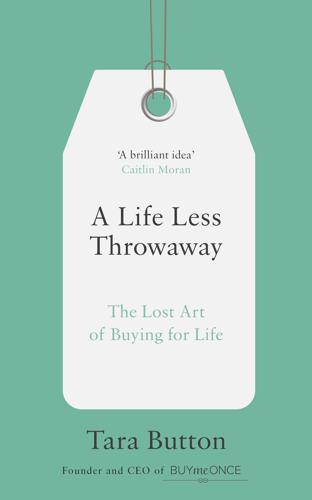
A Life Less Throwaway: The Lost Art of Buying for Life
by
Tara Button
Published 8 Feb 2018
This is possible, and a couple of forward-thinking technology companies have adopted modular options as part of their conscientious policy, e.g. Fairphone, which we have identified as the BuyMeOnce smartphone company of choice (see overleaf). Smartphones The Fairphone is the BuyMeOnce mobile phone because it is designed to be upgraded. Each part can be replaced and customised. Want a better camera? No problem. Need more storage? You’ve got it. On top of that, Fairphone have actively tried to solve a problem other phone companies have ignored. In the past, it was impossible to find ethically sourced raw materials for phones, but Fairphone have managed to change that. They also offer a two-year warranty, double the warranty of most other smartphones, and encourage you to fix your phone to make it last as long as possible.
…
Crowdfunding platforms such as Kickstarter help us because they allow engineers and makers to go straight to the customer without retailers or marketers in between. This means engineers who want to make longer-lasting products can offer them to the public, and if we like the idea, it may well get funded. When they make their products unfixable •Vote with your wallet and look for fixable modular versions of products. For example, a Fairphone can be taken apart and upgraded easily. •If you have a product that needs fixing, visit your local Restart Project or Repair Café, or start your own group through online sites such as meetup or Facebook. If you haven’t repaired a product before, seek an expert’s advice first. Some products are perfectly repairable by a civilian; however, electricity is serious stuff, so do your homework and use parts approved by the manufacturer if possible.
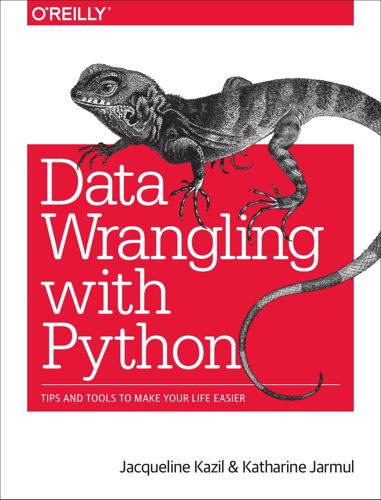
Data Wrangling With Python: Tips and Tools to Make Your Life Easier
by
Jacqueline Kazil
Published 4 Feb 2016
Here is some example output (it’s a social media timeline, so yours will look different than what’s shown here): [{'full_name': u'Stefan Brand', 'original_link': None, 'picture': u'https://pbs.twimg.com/media/COZlle9WoAE5pVL.jpg:large', 'short_name': u'', 'text_content': u'Simply @Fairphone :) #WeAreFairphone http://t.co/vUvKzjX2Bw', 'timestamp': u'POSTED ABOUT 14 HOURS AGO'}, {'full_name': None, 'original_link': None, Browser-Based Parsing | 319 'picture': None, 'short_name': u'', 'text_content': None, 'timestamp': None}, {'full_name': u'Sietse/MFR/Orphax', 'original_link': None, 'picture': None, 'short_name': u'', 'text_content': u'Me with my (temporary) Fairphone 2 test phone. # happytester #wearefairphone @ Fairphone instagram.com/p/7X-KXDQzXG/', 'timestamp': u'POSTED ABOUT 17 HOURS AGO'},...]
…
If you don’t have Firefox installed, you can either install it, or install the Selenium driver for Chrome, Internet Explorer, or Safari. Let’s see if we can open a web page using Selenium (in our examples, we’ll be using Firefox, but it’s very easy to switch and use a different driver): from selenium import webdriver browser = webdriver.Firefox() browser.get('http://www.fairphone.com/we-are-fairphone/') browser.maximize_window() Imports the webdriver module from Selenium. This module is used to call any installed drivers. Instantiates a Firefox browser object by using the Firefox class from the web driver module. This should open a new Firefox window on your computer. Accesses the URL we want to scrape by using the get method and passing a URL.
…
CSS works because it defines rules that allow DOM elements to be grouped together (or separately defined) by attributes within the tags. Remember when we explored XML in Chapter 3 and looked at nested attributes? CSS also uses these nested attributes. Let’s take a look using our element inspection tools. Because you are likely still on the Fairphone site, let’s take a look at some of the CSS on the page. When we highlight an element in our bottom toolbar, we see some text displayed next to the corresponding element on the page (Figure 11-9). Analyzing a Web Page | 289 Figure 11-9. Introduction to CSS In this case, we already know what div means, but what is content-block?
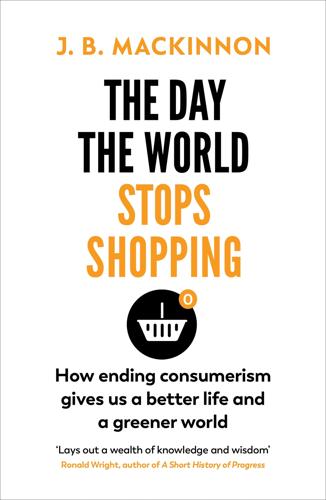
The Day the World Stops Shopping
by
J. B. MacKinnon
Published 14 May 2021
When things are not built to last, or we replace them once they no longer look new or in fashion, we lose the opportunity to form such a force of connection. Wabi-sabi is the mindset that gives the past a life in the present, but it can also be a vision of the future. Passing through Amsterdam, I visited the offices of Fairphone, a company that offers mobile phones that are built to last. The phones are modular, meaning they are easy to disassemble: they showed me how a broken screen could be replaced, or an older camera upgraded to a new one, in under a minute. Fairphone also offers software and security support far longer than the major phone manufacturers. Many of their customers are people who found the rapid replacement cycle of mobile phones wasteful.
…
But they discovered a different kind of deconsumer, too. As it turns out, many people who trade in their phones for the latest model do so with ambivalent feelings. They have formed an attachment to the device itself—its nicks, scratches and dents, the way it feels in their hand—and don’t want to give it up. Fairphone offers these customers what they are looking for: their old machine, able to do new tricks. A worn, dusty, weathered and jury-rigged future—it’s one of the most popular aesthetics in science fiction. Giant holograms above dingy streets in Blade Runner 2049, Neo’s tattered sweatshirt with the holes along the neckline in The Matrix, and the enduring appeal of steampunk, with its mashup of whalebone crinolines and quantum computing, zeppelins and space travel, are all wabi-sabi.
…
US Bureau of Labor Statistics. 100 Years of US Consumer Spending: Data for the Nation, New York City, and Boston. US Department of Labour, 2006. CHAPTER 13: Business plays the long, long, long, long game Other sources include Toraya Group archives, The Henokiens (henokiens.com), INSEAD Wendel International Centre for Family Enterprise, Fairphone and Low-tech Magazine (lowtechmagazine.com and solar.lowtechmagazine.com). Anthony, Scott D., S. Patrick Viguerie, Evan I. Schwartz, and John Van Landeghem. 2018 Corporate Longevity Forecast: Creative Destruction Is Accelerating. Innosight, 2018. Daepp, Madeleine I. G., Marcus J. Hamilton, Geoffrey B.

Survival of the Richest: Escape Fantasies of the Tech Billionaires
by
Douglas Rushkoff
Published 7 Sep 2022
But the more devastating impacts of pedal-to-the-metal digital capitalism fall on the environment, the global poor, and the civilizational future their oppression portends. The manufacture of our computers and smartphones still depends on networks of slave labor. These practices are deeply entrenched. A company called Fairphone, founded to make and market ethical phones, learned it was impossible. (The company’s founder now sadly refers to its products as “fairer” phones .) Meanwhile, the mining of rare earth metals and disposal of our highly digital technologies destroys human habitats, replacing them with toxic waste dumps, which are then picked over by impoverished indigenous children and their families, who sell usable materials back to the manufacturers—who then cynically claim this “recycling” is part of their larger efforts at environmentalism and social good.
…
Chapter 4: The Dumbwaiter Effect 47 “The integration of all Uber brands … life” : Megan Rose Dickey, “Uber Unveils New Skyport Designs for Uber Air,” TechCrunch , June 11, 2019, https:// techcrunch .com /2019 /06 /11 /uber -unveils -new -skyport -designs /. 47 RVs and those living in cars : Marina Gorbis, “Hiding in Plain Sight: America’s Working Poverty Epidemic,” Medium , April 14, 2021, https:// medium .com /institute -for -the -future /hiding -in -plain -sight -americas -working -poverty -epidemic -740f0b7202ea. 49 “renewables” : Richard Maxwell and Toby Miller, Greening the Media (New York: Oxford University Press, 2012). 49 “the dumbwaiter effect” : Douglas Rushkoff, Throwing Rocks at the Google Bus: How Growth Became the Enemy of Prosperity (New York: Penguin Portfolio, 2016), 19. 50 miscarriages, cancers, and shortened lifespan : Producing the Fairphone , directed by Geert Rozinga (De Eerlijke Onderneming, 2016), https:// www .vpro .nl /programmas /tegenlicht /kijk /afleveringen /2016 -2017 /de -eerlijke -onderneming .html. 51 “create the perfect tee” : Amazon, “Made for You,” https:// www .amazon .com /stores /made+for+you /page /E853E0F0 -6F79 -442D -B7E8 -3A0E0531FAF2, accessed August 9, 2021.
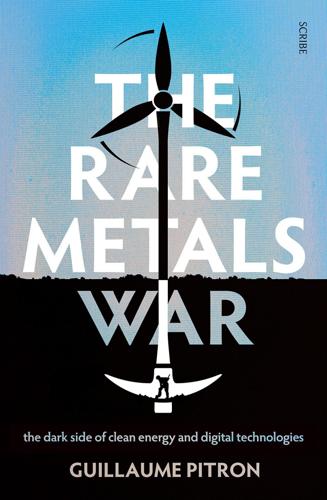
The Rare Metals War
by
Guillaume Pitron
Published 15 Feb 2020
The artisanal cobalt mines in the Democratic Republic of Congo are mentioned, but nothing is said of their environmental impact.34 Consumers could have led the resistance: their choice to buy or boycott has the power to redirect the market and change its practices. They had the information: numerous documentaries have exposed the distressing environmental and social impact of electronic goods, as have countless NGO reports.35 Consumers would have needed to put pressure on manufacturers to design more ecological products, such as the repairable Fairphone,36 and to use their votes to pressure their governments to beef up feeble anti-obsolescence regulations. But consumers would hear nothing of it: a connected planet was better than a clean one. But there is hope. New consumer rights regulations have emerged, such as the law passed in 2015 in France that requires manufacturers to inform consumers about the availability of spare parts.
…
‘Environmental Responsibility Report, 2019 Progress Report, Covering Fiscal Year 2018’, Apple Inc, 2019. ‘Environmental Impact Report’, Tesla Motors, Inc., 2019. To give just one example, read ‘Time to Recharge: corporate action and inaction to tackle abuses in the cobalt supply chain’, Amnesty International, 2017. ‘The Fairphone, a No-conflict Smartphone without Planned Obsolescence’, World Forum for a Responsible Economy, 28 July 2017. ‘The “Right to Repair” Movement Wants You to Be Able to Fix Your Own Stuff’, Public Radion International, 24 December 2018. Visit The Restart Project website. ‘Meet the $21 Million Company that Thinks a New iPhone Is a Total Waste of Money’, Inc, April 2017.
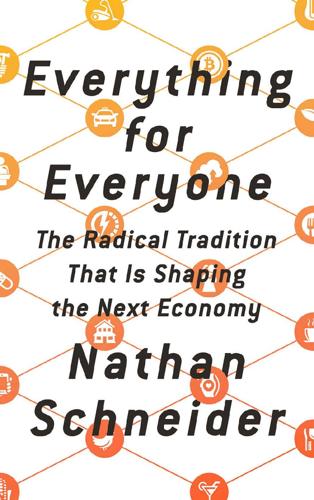
Everything for Everyone: The Radical Tradition That Is Shaping the Next Economy
by
Nathan Schneider
Published 10 Sep 2018
Just as the monopolies of connective railroads inspired the US antitrust laws of a century ago, a recognition is growing that we need new laws and new will for enforcement to regulate the emerging online utilities.27 Enabling transitions to more democratic ownership designs may be a way to help these companies better self-regulate, rather than inviting more stifling regulatory regimes. It’s also necessary to look beyond the virtual platforms to their material substrates. This means considering the human conditions surrounding the mineral extraction and assembly of the hardware on which platforms depend. Notably, Britain’s Phone Co-op promotes the Fairphone, a Dutch smartphone built with decent working conditions and conflict-free minerals, and the Indonesian co-op KDIM is building its own locally produced smartphone. In the United States, where the large internet-service providers are among the country’s most hated companies, cooperative and city-owned ISPs have already shown that there’s a faster, cheaper, accountable alternative.
…
B., 6, 55–56 Duran, Enric, 115–117, 219 borrowing without repaying of, 118–119 FairCoin fair-trade and, 130–131 FairCoop work of, 131–132 hacking of, 129 Infospai set up by, 118 Integralism work of, 128–129 underground activities of, 130 “Economic Cooperation Among Negro Americans” (conference), 55 ecos (CIC native currency), 125 Ecuador, 209–215 Edgeryders, 25–26, 29–31 education, 61, 68, 154, 158–159 Electric Cooperative Leadership Institute, 178 electric co-ops, 16, 169–170 community not represented by officials of, 179 customer-centered business of, 174 farmers using, 4–5, 181–182, 184 federal regulatory disputes of, 173 government backed, 176–177 renewable energy use of, 175 self-governance of, 171–172 Ellis, Aunjaune, 205 Emacs software, 135–136 Emilia-Romagna, Italy, 62–63 employee ownership, 7, 8, 16, 54, 81, 140, 158, 227 employee stock-ownership plans (ESOPs), 7, 8, 81, 227 Enspiral, 93–96 Enspiral Dev Academy, 95–96, 158 entrepreneurs, 35, 80, 155–156 Epstein, Steven A., 34–35 Espai de l’Harmonia, 122 Ethereum, 111–113, 130, 159, 223 European Capital of Culture, 26, 32 Evans, Blair, 73 Evers, Medgar, 191 Facebook, 31, 143–144, 153, 218–219 Fairbnb, 155 FairCoin, 116, 128, 130–131 FairCoop, 116, 129, 131–132, 219 Fairmondo, 150, 160 Fairphone, 162 fair-trade movement, 9, 49–50, 150 Farm Bureau insurance system, 56–57 Farm Credit System, 104 farmers African American, 62, 200 co-op systems used by, 54 co-ops helping independent, 69–70 co-ops of, 66, 227 data sold by, 153 electric co-ops used by, 4–5, 181–182, 184 Farmers’ Alliance, 54 Farrakhan, Louis, 191 Farrell, John, 175 federation, 13, 21, 51, 66, 168, 183 Federation of Southern Cooperatives, 200 fediverse, 167–168 feedback loops, 13 feudalism, 39, 77, 212, 224 Filene, Edward, 7, 59 finance, 8, 77–78, 103–104, 116, 188 fiscal disobedience, 129 Flanders, Laura, 190, 192 FLOK Society, 209–210, 214 Forno, Francesca, 231 Foster, Natalie, 223 Francis of Assisi, 23 Franciscan communities, 23 Franco, Francisco, 61 Frank, Mary, 101 Franklin, Benjamin, 43, 183 free labor, 44 Freedom Farm, 200, 204 freelancers, 144 free-market advocates, 186 free-software movement, 135, 137, 140–141 [freespace] storefront, 138, 139 (photo) Friedman, Milton, 222 Fromm, Erich, 117 game theory, 107 Gandhi, Mohandas K., 16 Garrett, Socrates, 201–203 Garza, Alicia, 199 Gates, Bill, 107 Generation Opportunity, 186 geographic mobility, 216 Getty Images, 148 Gibson, Mel, 24 Gicheru, Esther, 66, 67 (photo) gig work, 154 Gino, Francesca, 7 Git software, 139 GitHub, 95, 139, 141 The Gleaners (painting), 142 gleaning, 142–143 God’s creation, in Digger cosmology, 39–40 Golf Ball Divers Alliance, 154 “Good Knowledge Summit,” 213 Google, 112, 134, 136–137, 141, 143, 153, 155, 160, 164, 216, 220 Googleplex, 112, 136, 220 Gorenflo, Neal, 150 Graham, Martha, 102 Gratian, 23 Greeley, Horace, 53, 66 Green Bay Packers, 165, 205 Green Taxi Cooperative, 84–89, 87 (photo) grocery stores, 80–81 gross domestic product, 66 Growers Agricultural Data Cooperative, 153 Guardian article, author’s, 165 Guerrilla Translation, 160 A Guide for Members of REA Cooperatives (booklet), 176 (fig.)
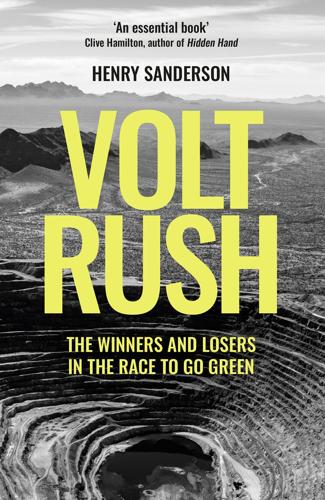
Volt Rush: The Winners and Losers in the Race to Go Green
by
Henry Sanderson
Published 12 Sep 2022
His message was simple: consumers could feel assured that the car they were driving did not contain a piece of metal that had travelled from the dusty mines of the Congo into their garage. It was comforting to ignore the Congo, to wish it out of existence. Monique Lempers, from the sustainable phone maker Fairphone, said the Amnesty report had made companies adopt a ‘risk-averse approach’, to ensure there was no child mining of cobalt, rather than to engage with the issue. ‘There was a lot of resistance from Western companies to engage in ASM [artisanal] cobalt, whereas the fact you are sourcing from a mine that is not yet perfect but showing improvement is far better than saying it doesn’t exist when we know the problem is out there and flowing somewhere in the supply chain.’
…
Index Adkerson, Richard 178 Agrium 85 Albemarle 59, 66, 77 Allen, Matthew 152 Allende, Salvador 78, 79 Altura 64, 65 aluminium 3, 211 Amnesty International 90, 132–5, 139–40 Amoco 199 Annan, Kofi 102 Anno, Yasuo 219, 220 Apple 112, 123, 131, 133–4, 213 Arctic Circle 224–5 Arfwedson, Johan 49 Argentina 34, 51–2, 68–70 Arnstadt (Germany) 32–3 Asahi Kasei Corporation 21, 30 ASM, see mining: artisanal A&T Battery 30 Atacama Desert (Chile) 3, 57, 73–8 ATL 37–9, 42, 43 Attenborough, David 195 Audi 32, 40 Australia 5, 34, 57, 59–66, 67–8, 84 and coal 97 and copper 179 and nickel 154, 157 AVZ Minerals 68 Bacanora Lithium 48 Bachelet, Michelle 85 baitong (white copper) 155 Bajo people 166 Baros, Vanja 110 Barron, Gerard 188–90, 191, 192, 195–6 batteries 2–3, 7–8, 25–7, 34–5, 36–9, 50–1 and Edison 15–16, 17–18 and electric cars 13–14 and Europe 32–4, 218, 219–22 and Global Alliance 141 and Goodenough 27–8, 29 and history 23–5 and Japan 29–31 and LFP 245–6 and lithium-ion 19–20, 21–2 and Northvolt 222–3 and recycling 209–10, 213–17 and UK 243–4 see also cobalt; lithium; nickel Beijing, see China Belgium 135–6, 137, 184, 202–4; see also Leopold II of Belgium, King Bell Labs 37 ‘Belt and Road Initiative’ (BRI) 162–3 Berlin, Anton 226 Best, Eric 100 beta-alumina 25 BHP 154–5, 176 BHR Partners 179 Biddle, Neil 61–2, 63 Biden, Hunter 179 Biden, Joe 180 billionaires 3, 34–5, 71, 173, 178, 192, 224–5; see also Gertler, Dan; Glasenberg, Ivan; Jiang Weiping; Musk, Elon; Ponce Lerou, Julio Bitrán, Eduardo 76–7, 78, 81–2, 85, 86, 87 Bitumba, Robert 146, 147–8 BMW 32, 33, 42, 66, 140 Bobenrieth, Eduardo 81 Bolloré 220 Boscawen family 231, 240 Boskalis 199 BP (British Petroleum) 115 Braungart, Michael: Cradle to Cradle: Remaking the Way We Make Things 211 Brazil 154, 179 Brearley, Harry 155 Bringedal, Bård 153 Brinsden, Ken 62–4, 65, 67–8 Bristow, Mark 117 Brockovich, Erin 165 Brodesser, Bastian 90 Brooks, Tim 172 Broughton, David 172, 185 Brown, Steven 165, 166, 167 Bucher, Alejandro 76, 78 Büchi, Hernán 82 Buffett, Warren 41 Burma 183 Bush, George W. 105 BYD 38, 41, 129, 131, 245 Cade, John 49–50 Caesens, Elisabeth 130, 142 Calaway, James 52 Camba, Alvin 164 Cameron, James 192–3 Canada 68–9, 84 and nickel 154, 156, 157, 173, 182–3 carbon dioxide 27, 66–7, 165, 220 and deep sea 193, 196 and emissions 4, 212, 222, 224 Carlsson, Peter 218–20, 222–3 Carlyle Group 38–9 Carroll, Rory 129 cars 14, 15, 16–17, 18–19, 39–40, 212 and recycling 211, 214–16 see also electric vehicles Carson City (NV) 208–9 Carter, Assheton Stewart 135 Casement, Roger 137 Casson, Louisa 195 Castro, Fidel 78 cathodes 27, 29, 30, 31 CATL (Contemporary Amperex Technology) 32–3, 34–5, 42–6, 96, 131 and nickel 159, 164 CDM 122, 130, 132–3 Cerruti, Paolo 219 Challenger, HMS 197 Chamberlain, Matthew 141, 142 Chen, T.H. 37, 38 Chen Jinghe 186 Chen Xuehua 122, 127, 159 Chevrolet 52 ‘Chicago boys’ 72, 79, 81 child labour 90, 92, 93, 129, 139, 140–1 and Huayou 122–3, 124–5, 134–5 and Kasulo project 146, 147, 148 Chile 5, 51, 71–3, 78–81, 162 and copper 172, 175, 176, 180 see also Atacama Desert; SQM (Sociedad Química y Minera de Chile) China 2, 3, 4–5, 105, 128, 185–7 and Amnesty 139 and Argentina 68–9 and Australia 60–1, 62–6, 67–8 and BRI 162–3 and cars 39–40 and CATL 32–9 and Chile 71–2, 75 and cobalt 96, 122 and commodities boom 109, 110 and copper 170, 171, 175–7, 178–9 and deep sea 200 and DRC 143, 144 and electric cars 40–6 and Europe 221–2, 223–4 and Indonesia 154 and Jiang Weiping 83–5 and nickel 155, 158–60 and PNG 150–1, 152, 153 and pollution 244 and supply chain 92 and Tianqi Lithium 85–7 and Tsingshan 160–2, 163–4, 167 and USA 113–14 and Wang Xiaoshen 47–8 and Xinjiang 56–8 and Xinyu 52–6, 58–9 see also Huayou Cobalt China Africa-Development Fund 131 China Molybdenum 117, 178–80 Church of England 119, 120 CIA 198–9 circular economy 213 CITIC Metal 170, 186 Clarion-Clipperton-Zone 189–90, 192, 194, 200, 204 Clean Air Act (1970) 23 Climate Action 100+ 119 climate change 1, 2, 23, 27, 33, 40, 50 coal 4, 5, 11, 67, 109 and China 57, 61, 222 and Glencore 97, 119 and nickel 157, 163–4, 165 cobalt 3, 4–5, 9, 30, 34–5, 124 and deep sea 191 and DRC 92–4, 99–102, 106, 107–8, 115–18, 121–3 and electric cars 138–40 and Glencore 89–90, 95–7, 142–3 and health risks 124–5 and LME 141–2 and PNG 150–3 and prices 143–4 and recycling 209–10, 213 and Volkswagen 88–9, 90–1 see also Huayou Cobalt Cohen, Michael 110 Colby, William 198 Coldelco 74 Communist Party 34, 40, 56, 83, 84 Congo, see Congo Free State; Democratic Republic of Congo (DRC) Congo Dongfang Mining International (CDM) 122 Congo Free State 135–7 Conrad, Joseph 137 Conservation International 195 consumerism 123–4 Contesse, Patricio 76, 79 copper 3, 5, 9, 97, 173–6, 180–1 and Australia 67 and Bougainville 152 and Chile 73–5, 78–9 and China 176–7, 178–80 and Cornwall 236 and DRC 100–2, 106, 107–9, 169–73, 177–8, 183–5, 186–7 and Japan 157 Corfo 77, 79, 80, 81 Corliss, Jack 193 Cornwall 228–9, 230, 231, 232–6, 238–9 and landowners 239–41 and tin mining 236–7 corruption 72, 76, 80, 98, 142 and DRC 92–3, 104, 107 and Gertler 102–3, 110–12 Covid-19 pandemic 7, 65, 67, 167–8, 218 Crane, Lucy 235, 237, 239 Crawford, Matthew 13 Cronstedt, Axel Fredrik 155 Cultural Revolution 36, 40, 83 Daimler-Benz 23, 33 Dauvergne, Peter 123, 124, 244 deep sea 188–201, 202–6 and tailings 150, 152, 153 DeepGreen 189–90, 196 DEME 202–5 Democratic Republic of Congo (DRC) 3, 4, 34, 68, 115–17, 142–3 and Amnesty 132–5 and BRI 162 and cobalt 89, 92–4, 95–7, 121–3, 124 and copper 169–73, 177, 179–80, 183–5, 186–7 and electric cars 138–40 and Gertler 102–3, 104–5, 110–12 and health risks 124–5 and Huayou Cobalt 125–8 and Katumba Mwanke 106–7 and mining 99–102, 107–9, 117–18, 128–9 see also Congo Free State; Kolwezi Deng Pufang 186 Deng Xiaoping 161, 186 Deripaska, Oleg 227 diamond industry 103–5, 200, 203 diesel 220 Diess, Herbert 223 Dodd-Frank Act (2010) 122 Dongguan (China) 35–9 Dos Santos, Isabel 183 Double, Steve 233 DRC, see Democratic Republic of Congo (DRC) Dunlop, John 136 Earth Day 22 Edison, Thomas 10, 13, 14–16, 17–19, 21 and copper 174 and nickel 156 electric vehicles (EVs) 1–3, 4–5, 7–9, 11–14, 16–17 and Australia 62 and carbon footprint 66–7 and China 40–6, 54–6, 63, 64, 96 and cobalt 115–16, 126–7 and copper 74, 174–5, 180 and DRC 138–40 and Edison 15–16, 17–18 and Europe 220–1, 223–4 and ExxonMobil 26–7 and Ford 24–5 and Germany 32–4 and history 10 and lithium 52 and nickel 154–5, 158, 164 and outsourcing 92 and recycling 213–17 and Straubel 207–9 and SUVs 244–5 and UK 243–4 and Volkswagen 22, 88–9, 90–1 see also batteries electricity 14–15, 23–4, 174; see also electric vehicles emissions, see carbon dioxide Environmental Protection Agency 23 environmentalism 124, 126, 165–6, 167–8, 244 ERG 141 Europe 33, 218–22, 223–4, 227; see also Belgium; Germany; Sweden; United Kingdom European Battery Alliance 221 EVs, see electric vehicles ExxonMobil 22, 25, 26–7 Fadell, Tony 4 Fairphone 140 Falconbridge Nickel Mines 156 ferrite 39 Figureres, Christiana 246 fishing 151, 166 FMC 51–2, 58, 59 Foote Mineral 51 Force Publique 136 forced labour 136, 137 Ford, Henry 8, 9, 10, 14–15, 18–19, 24–5 and natural resources 210–11 Ford (company) 145 Freeport-McMoRan 176, 178, 179 Friedland, Robert 117, 173, 175, 180–7 Gait, Paul 186–7 Galvani, Luigi 23–4 Galyen, Bob 33, 42, 43, 45 Ganfeng Lithium 47–9, 52–3, 54–6, 58–60, 66 and Argentina 68–70 and Australia 64 Garrett, Nicholas 139 gas 67 Gécamines 106, 107, 108, 113, 114, 115–17 GEM Co. 96, 164, 165 General Electric 216 General Lithium 63 General Motors 8, 19 geopolitics 4, 67, 92 geothermal energy 237–8 Germany 32–4, 35; see also Volkswagen Gertler, Dan 93, 102–5, 107, 108, 110–11 and Glencore 111–12, 118 and sanctions 112–13, 114, 142 Ginting, Pius 166, 168 Glasenberg, Ivan 90, 95–9, 109, 111, 113, 117 and coal 119, 120 Glencore 89–90, 92–3, 95–7, 113–15, 117, 213 and artisanal mining 140 and coal 119–20 and cobalt 142–3 and copper 176–7 and DRC 99, 100–2, 107–9 and Gertler 102–3, 111–12, 113 and nickel 154–5, 156 and Tesla 118–19 Global Battery Alliance 141 global warming, see climate change Glomar Explorer (ship) 198–9 gold 62, 73, 117, 171, 182–3, 186 and recycling 213 and South Africa 169, 230 Goldman, Jack 25 Goldman Sachs 43, 64, 110, 223 Good Shepherd 147 Goodenough, John 21, 22, 23, 27–9, 31 Google 213 Grant, Alex 66–7, 237–8, 239 Great Wall Motor 64 Greenberger, Jim 43–4 Greenbushes (Australia) 57, 59, 64, 84, 86 greenhouse gases, see carbon dioxide Greenpeace 195, 225 Groupe Bazano 107–8 GSR (Global Sea Mineral Resources) 202–6 Guilbert, John 177 Haley, Nikki 112 Hamanaka, Yasuo 157 Hamze, Alex 107–8 Hanrui Cobalt 135 Hanwa 164 Harita Group 165 Hayes, Denis: Rays of Hope: The Transition to a Post-Petroleum World 23 Hayward, Tony 115, 119 health 49–50, 124–5, 165 Hein, James 192, 196 Heizmann, Jochem 43 Heydon, David 191 Hoekstra, Auke 245 Hong Kong 36, 37 Hoover, Herbert 62 Hu Yaobang 35 Huawei 44, 67 Huayou Cobalt 90, 93, 122–3, 125–8, 129–31, 138 and Amnesty 132–5 and Kasulo project 144–8 and nickel 159, 165 and public opinion 246 Hughes, Howard 198 Hull (UK) 243–4 hydrogen 208, 245 Icahn, Carl 178, 179 India 85, 97, 119, 181, 182 Indonesia 5, 34, 162–4, 176, 237 and nickel 154, 157, 158–60, 164–8 internal combustion engines 14, 18, 32, 33 International Energy Agency (IEA) 9 International Seabed Authority (ISA) 192, 200–2, 204, 205 iPods 4, 19–20, 37, 38 Iran 98 Iraq 11–12 Irish, Stephen 244 iron ore 17, 60–1, 62, 67 Israel 103 Ivanhoe Mines 117, 186 ivory 135, 136, 137 Japan 29–31, 37, 38, 39, 157 Jarvis, Andrew 239–40 Jasanoff, Maya 136 Jevons, William Stanley 212 Jiang Weiping 83–5 Jinchuan 129 Jobs, Steve 117, 181, 182 Johnson, Boris 233 Johnston, Bill 68 Jokowi, President 159, 160, 167 Jones, Dan 195 Kabila, Joseph 93, 102, 105, 106, 107, 112 and China 128, 177 and mining 116, 117–18 Kabila, Laurent 104–5, 106, 128, 183–4 Kama, Geoffrey 153 Kamisa, Yossi 104 Kamoa-Kakula mine (DRC) 169–73, 185, 186–7 Kanellitsas, John 48–9, 69 Kansuki (DRC) 108 kaolin 228–9 Kara, Siddharth 130 Kasulo (DRC) 121, 124, 126, 132, 144–8 Katanga Mining 113, 114 Katumba Mwanke, Augustin 106–7, 110 Kavanagh, Michael 121 Keevil, Norman 173 Kenwright, Mark 100 Kiribati 189 Kobylkin, Dmitry 225 Kolwezi (DRC) 101, 113, 116, 121–3, 129–31, 139 and Amnesty 132 and Kasulo project 144–8 Kuka 34, 55 Kummer, Joseph 24 Kumungu, Vital 130 Lagos, Ricardo 81 Landerretche, Óscar 74 Larmer, Miles 184 laterites 157 Law of the Sea 192, 195, 199, 200–1, 205 LDK Solar 54 lead-acid batteries 15–16, 17, 19, 24–5, 190 Leclanché 220 Lee, Bryce 125–6, 127, 130, 134, 135, 144–5, 146–7 Leibovitz, Chaim 105 Lempers, Monique 140 Lennon, Jim 160, 164, 165 Leopold II of Belgium, King 102, 115, 135, 136, 137 LG Chem 43, 131, 138, 145, 167 Li, Gabriel 39 Li, Steele 117 Li Changdong 159 Li Liangbin 58 Liang Shaokang 37 Liao, Anna 54–5 Lithco 51 lithium 3, 4–5, 8–9, 34, 49–51 and Argentina 68–70 and Australia 61–6, 67, 68 and Chile 71–3, 74, 75–6, 77–8, 81–2 and Cornwall 228, 229, 232, 233–6, 238–9 and geothermal energy 237–8 and iron phosphate (LFP) batteries 245–6 and prices 47–8 and producers 51–2 and recycling 209–10, 213 and Tianqi Lithium 83, 84–7 and Xinjiang 57–8 and Xinyu 52–3, 54–6, 58–9 Lithium Americas 68–9 lithium-ion battery 19–20, 21–2, 26–7, 30–1, 37–9, 42–6 Lockheed Martin 198–9, 200 Lodge, Michael 200–2 London Metal Exchange (LME) 91–2, 112, 141–2 and copper 175–6, 178 and nickel 157–8, 159 Longueira, Pablo 76 Low, Andrew 84 Lowry, Joe 48, 52, 59, 68 Luhut Binsar Pandjaitan 159–60, 167 Lukas, Wolf-Dieter 33–4 Lundin, Adolf 177–8 McCall, Bruce 13 MacDonald, Norman 183 McDonough, William: Cradle to Cradle: Remaking the Way We Make Things 211 McGregor, Ewan 214 McKibben, Bill 4 Macri, Mauricio 69 Madhavpeddi, Kalidas 179 Maersk 189 magnetics 36, 37, 39, 156 Magnitsky Act (2012) 112–13 malachite, see copper Malaysia 119, 237 Malnic, Julian 190–1 manganese 31, 197, 199, 201 Manthiram, Arumugam 27–8 Mao Zedong 83, 127, 186 Marc Rich & Co. 98–9 marine systems 150–4, 166–7 Mason, Edward 120 Mazzocco, Ilaria 41 Melin, Hans 216–17 mental health 49–50 Mercedes-Benz 32, 34 Mero, John: The Mineral Resources of the Sea 197, 199 Metallurgical Corporation of China (MCC) 153 Mexico 48, 236 MG 34 Midea 34 military, the 50 Miller, W.A. 234 mining 3–5, 8–9, 84, 90, 182 and artisanal 128–9, 130–1, 139–41 and Australia 60–2, 63–5 and Chile 74–5 and coal 119 and cobalt 91–2, 93–4 and copper 169–73, 176–8, 179–81, 184 and Cornwall 228–9, 230, 231, 232, 233–7, 238–9, 240–1 and deep sea 189–91, 194–7, 199–206 and DRC 99–103, 106–8, 116–18 and environmentalism 245 and Huayou 143–6 and Kolwezi 121–3 and lithium 50 and nickel 165–8 and PNG 150–4 and Xinjiang 56–7 Mistakidis, Aristotelis (Telis) 109, 112, 114 mobile phones 30, 37, 38, 213 Mobutu Sese Seko 95, 104, 106, 177–8 Mojon, Alex 150–3 Mongolia 173, 183 Morel, Edmund 137 Morowali Industrial Park (Indonesia) 162, 163–4, 166 Morrison, Scott 67 Motorola 38 Muller, Liz 134 Musk, Elon 2, 3, 7–9, 64, 118–19 and Indonesia 167 and nickel 154–5 and Russia 225 Mutanda (DRC) 99–102, 107–8, 113 NAATBatt 43 Namibia 200, 203 natural resources 210–13 Nauru 189 Nautilus Minerals 190, 203 Nemery, Benoit 124, 148 New Caledonia 157 Newman, Mark 30–1 nickel 3, 9, 31, 34, 97, 182–3 and deep sea 191 and Edison 17, 18 and history 155–7 and Indonesia 162–8 and PNG 150–4 and prices 157–8 and recycling 209–10 and Russia 224, 226–7 and Tesla 154–5 and Tsingshan 158–60, 161–2, 163–4 Ningbo Lygend 165 Ningde (China) 32, 33, 35, 36, 42 Nio 34 Nissan 52 Nixon, Richard 23 Nobel Prize 21 nodules 189–91, 192, 193–4, 197, 199, 204 Nokia 37, 38, 131 Norilsk Nickel (Russia) 224–7 Northvolt 218–20, 222–3 NTT Docomo 37 nuclear weapons 50, 56 Ocean Minerals Co. 199 Och-Ziff 110–11 oil 3, 4, 9, 11–12, 98 and China 34, 39, 40, 57–8, 67 and pollution 22–3, 224–5 and prices 27 and Saudi Arabia 115–16 and shortages 25 see also petrol Olenga, François 112 oligarchs 226–7 OMI 199 Organisation for Economic Co-operation and Development (OECD) 123, 140, 143 Outokumpu 159 Pacific Ocean 189–90, 194 Pakenham, Thomas 136 Pakistan 97, 119 paktung 155 Pampa Calichera 80 Papua New Guinea (PNG) 150–4, 191 Pardo, Arvid 199 Patania II (robot) 202–3, 204 Peru 176–7 petrol 1–2, 8, 11–12, 14–15, 16–17, 18–19 Philippines 157, 196 Pilbara Minerals 61–4, 65 Piñera, Sebastián 85–6 Pinochet, Augusto 51, 71, 72, 73, 79, 81, 82 Pinochet, Verónica 72, 78, 79 planned obsolescence 213, 216 Planté, Gaston 16, 24 Poldark (Graham) 229, 241 pollution 22–3, 34, 150–4, 165–6, 224–6 and China 2, 39, 40, 58, 244 polyacetylene 30 Ponce, Eugenio 79, 82 Ponce Lerou, Julio 59, 71–3, 76, 77, 78 and SQM 79–81, 82–3 and Tianqi Lithium 85, 86 potassium chloride 75 Potanin, Vladimir 224, 226–7 Potash Corp 85 Putin, Vladimir 224–5 Quadricycle 14, 15 Quitter, Matthew 214–16 Raby, Geoff 67 Ramu (PNG) 150–3 Randgold 117 Rautenbach, Billy 129–30 RCS Global 145, 146 re-use, see recycling Reagan, Ronald 27 Reagen, Kongolo Mashimango 123 recycling 126–7, 195, 209–10, 213–17 Redwood Materials 209–10 Rees-Mogg, Jacob 233 Rich, Marc 98–9, 120 Rio Tinto 152, 183 robots 34, 55, 202–3, 204–5 Rockwood 59, 84–5 Romney, Mitt 158–9 rubber 135–6, 137 Russia 154, 157, 224–7; see also Soviet Union SAE Magnetic 36 Saft 220 Samsung 43, 131, 133, 142, 213 Sangadji, Arianto 165–6, 167 Santillo, David 195 Schnitzer, Moshe 103 Schulders, Franck 89–90 sea, the 150–4; see also deep sea Seascape 193, 194 Secker, Peter 48 Šefčovič, Maroš 221, 222, 224 Shell Billiton 199 Sicomines 128 SK Innovation 142 slave labour 136, 137 smartphones, see mobile phones Smil, Vaclav 246 Smith, Paul 113 Sobotka, Benedikt 141 software 12, 13 solar power 54, 69, 73, 75, 245 and China 4–5, 45 Sony 30, 31, 38, 51, 131, 219 Sorensen, Charles 9 South Africa 97–8, 109, 157, 169, 201, 230 Soviet Union 56, 198–9 Sovocool, Benjamin 138–9 Sparenberg, Ole 197, 199 SQM (Sociedad Química y Minera de Chile) 51, 57, 58, 59, 75–8, 81–2 and Argentina 68–9 and Ponce Lerou 72–3, 79–81 and Tianqi Lithium 85–7 Srivastava, Anil 220 stainless steel 155–6, 158, 159, 161, 163–4 steam 16–17 steel 3, 4, 67, 245; see also stainless steel Stone, Greg 193 Storebrand 153 Straubel, J.B. 207–10 sulphides 157 Sun, Miles 186 Sweden 218, 219–20, 222–3 Sweeney, William 111 Taiwan 36 Takei, Takeshi 39 Talison Lithium 84–5 tantalum 61 TDK 36, 39 Tenke Fungurume (DRC) 177–8, 179–80 Tesla 1, 5, 11, 12, 48, 208–9 and Australia 62 and Carlsson 219 and China 44, 52–3, 54, 69 and cobalt 89 and Germany 33 and Glencore 112 and Model X 138 and nickel 165 see also Musk, Elon 3i Group 38 Tianqi Lithium 54, 71, 73, 83, 84–7 tin 84, 162, 213, 231, 232, 236–7 titanium 25, 26 Tonga 189 Toshiba 30 Toyota 23, 41, 211 trading, see London Metal Exchange Tregothnan estate (Cornwall) 231, 239–40 Trump, Donald 48, 113–14 Tsingshan 158–62, 163–5, 167, 246 tungsten 213 Ukraine 217 Umpula, Emmanuel 133, 147 United Kingdom (UK) 34, 200, 243–4; see also Cornwall United States of America (USA) 8–9, 14–18, 92, 198–9, 210–13 and copper 179 and corruption investigations 110–11, 112–13, 114–15 and Glencore 113–14 and gold mining 182 and lithium 48, 51–2 and pollution 22–3 and recycling 209–10 Vale 154–5, 167 Van Nijen, Kris 202–6 Van Reybrouck, David 129 Vescovo, Victor 192 Vietnam 119 Volkswagen (VW) 5, 8, 22, 33, 220, 222 and China 43 and cobalt 88–9, 90–1, 92 and DRC 145 and Glencore 112 and Huayou 131, 133 and Northvolt 223 Volta, Alessandro 24 Volvo 145 Wan Gang 40 Wang Xiaoshen 47–9, 55–6, 57, 58–9, 64, 69–70 waste 97, 150–5, 166–7, 209, 211, 213 Weaver, Phil 193 Weber, Neill 24 Wendt, Andreas 140 Wenzhou (China) 161 Whittingham, Stanley 21–2, 25–7, 55 Williams, Neil 234–5 wind power 97, 171, 174, 189, 243, 245 World Economic Forum (WEF) 141 World Trade Organization (WTO) 38, 159 Wrathall, Jeremy 228, 229–35, 236, 237, 238 Wu, Vivian 71, 84 Xi Jinping 35, 126, 162–3 Xi Zhongxun 35 Xiang Guangda 159, 160–2, 164 Xiaomi 213 Xinjiang province (China) 56–7 Xinyu (China) 47, 52–6, 58–9 Xpeng 34 Xstrata 109, 156 Xu Bu 86 Yama, Peter 152–3 Yang, Neill 44 Yantai Cash 142 Yeltsin, Boris 226 Yibin Tianyi Lithium 68 Yoshino, Akira 21, 29–30, 31 Yu Bo 178–9 Yudhoyono, Susilo Bambang 162, 163 Yuma, Albert 115–17, 143 Zahawi, Nadhim 233 Zaire, see Democratic Republic of Congo (DRC) Zambia 107, 172, 184–5 Zeng, Robin 32, 34, 35–8, 42, 43, 44, 45–6 and carbon emissions 224 Zhang Jimin 161 Zijin Mining 171, 186 A Oneworld Book First published by Oneworld Publications in 2022 This ebook edition published in 2022 Copyright © Henry Sanderson 2022 The moral right of Henry Sanderson to be identified as the Author of this work has been asserted by him in accordance with the Copyright, Designs, and Patents Act 1988 All rights reserved Copyright under Berne Convention A CIP record for this title is available from the British Library ISBN 978-0-86154-375-5 eISBN 978-0-86154-376-2 Typeset by Geethik Technologies Oneworld Publications 10 Bloomsbury Street London WC1B 3SR England
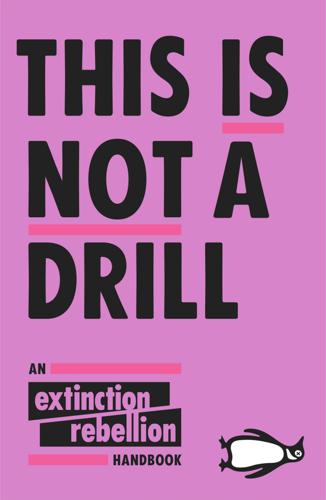
This Is Not a Drill: An Extinction Rebellion Handbook
by
Extinction Rebellion
Published 12 Jun 2019
Most of us became aware of these downsides in the form of automated jobs, the gig economy and the demise of local retail. But the more devastating impacts of pedal-to-the-metal digital capitalism fall on the environment and the global poor. The manufacture of some of our computers and smartphones still uses networks of slave labour. These practices are so deeply entrenched that a company called Fairphone, founded from the ground up to make and market ethical phones, learned it was impossible. (The company’s founder now sadly refers to their products as ‘fairer’ phones.) Meanwhile, the mining of rare earth metals and the disposal of our highly digital technologies destroys human habitats, replacing them with toxic waste dumps which are then picked over by peasant children and their families, who sell useable materials back to the manufacturers.
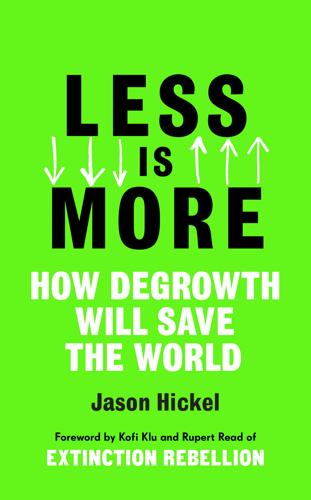
Less Is More: How Degrowth Will Save the World
by
Jason Hickel
Published 12 Aug 2020
It is madness too in terms of human labour, when you consider the millions of hours that are poured into producing smartphones and washing machines and furniture simply to fill the void created, intentionally, by planned obsolescence. It’s like shovelling ecosystems and human lives into a bottomless pit of demand. And the void will never be filled. In a genuinely rational and efficient economy, companies like Apple would innovate to produce long-lasting, modular devices (like the Fairphone, for example), scale down their sales of new products, and maintain and upgrade existing stock wherever possible. But in a capitalist economy, this is not an option. Some might be tempted to blame individuals for buying too many smartphones or washing machines, but this misses the point. People become victims of this machine.
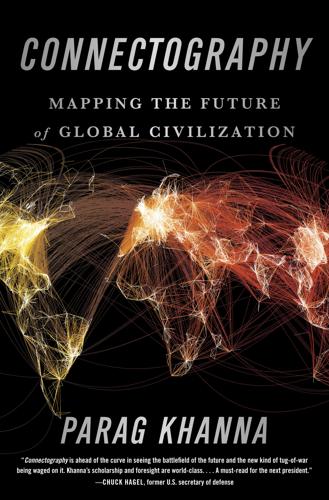
Connectography: Mapping the Future of Global Civilization
by
Parag Khanna
Published 18 Apr 2016
Abandoned by one supply chain, they have no choice but to turn to another: militant groups smuggling minerals across borders to fuel insurgencies. Rather than walking away from natural resources due to blanket regulations at home, Dutch companies such as Philips are at the forefront of setting up local companies to mine conflict-free minerals in Congo, with efforts backed up by social enterprises such as the Amsterdam-based Fairphone, which is working with Africans to manufacture their own mobile phones, offer servicing plans, and ultimately recycle them as well—holding on to the full supply chain. The supply chain is most useful when it is cleaned up on-site rather than scared away. TO MOVE OR NOT TO MOVE? The supply-demand world exposes some painful realities about what governments value most between natural and human resources.